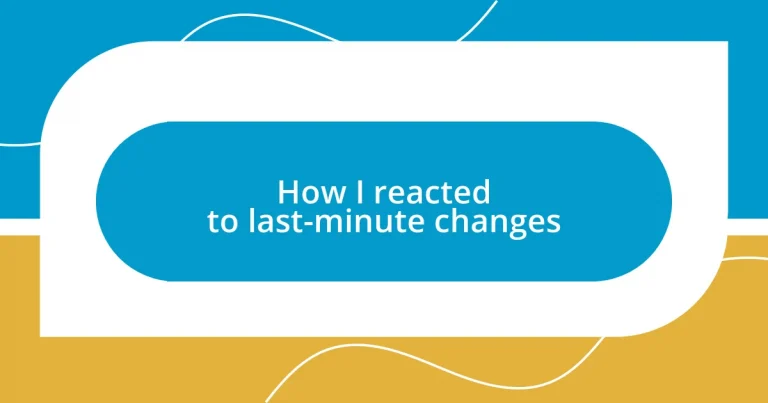Key takeaways:
- Understanding emotional triggers, such as loss of control and disappointment, can help individuals manage their reactions to last-minute changes effectively.
- Developing a flexible mindset and employing proactive change techniques, like scenario planning and open communication, fosters adaptability and enhances resilience during unexpected situations.
- Reflecting on past experiences allows individuals to learn valuable lessons and improve their approach to handling future changes, turning challenges into opportunities for growth.
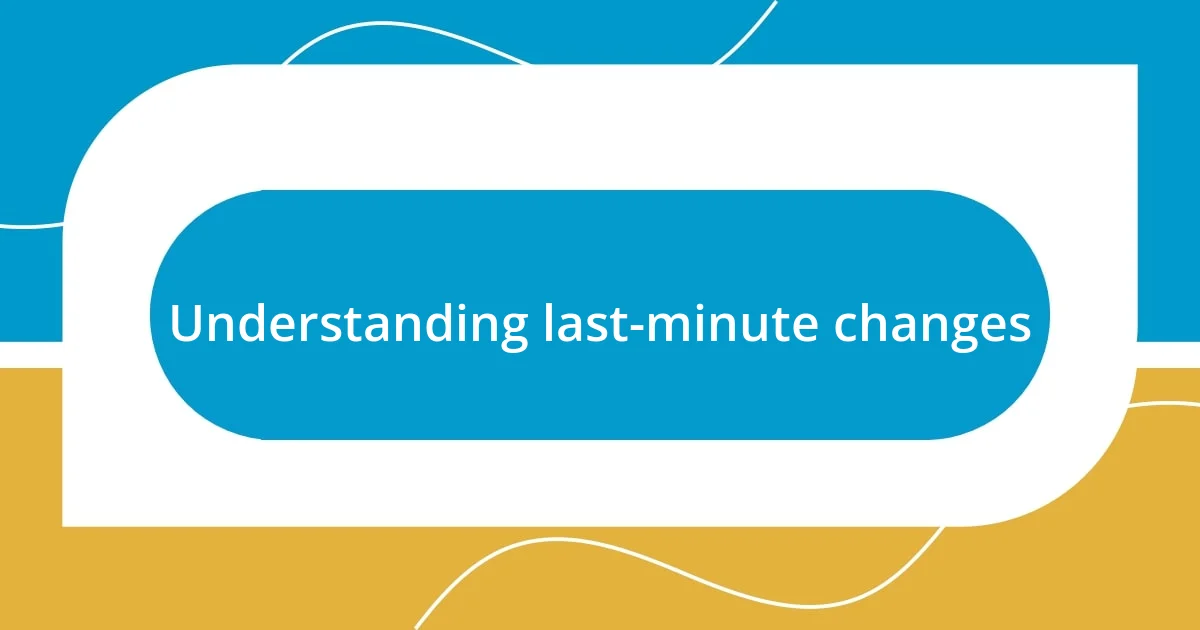
Understanding last-minute changes
Last-minute changes can feel like a sudden storm, can’t they? I remember preparing for a big presentation when, just hours before, my boss decided to switch the main focus. The adrenaline kicked in, and I felt that familiar mix of panic and excitement. It’s amazing how our minds can race in those moments, isn’t it?
Understanding the psychology behind these changes helps us navigate them better. Emotions like anxiety or frustration are common, but I’ve learned to channel that energy into creativity. For instance, when I embraced the unexpected tweak, I found new angles to explore that I hadn’t considered before. Have you found that sometimes these surprises lead to better outcomes?
Once, I faced a last-minute schedule shift that left me grappling with conflicting commitments. Instead of feeling defeated, I chose to adapt. This experience taught me that flexibility is key. How do you typically handle changes that disrupt your routine?
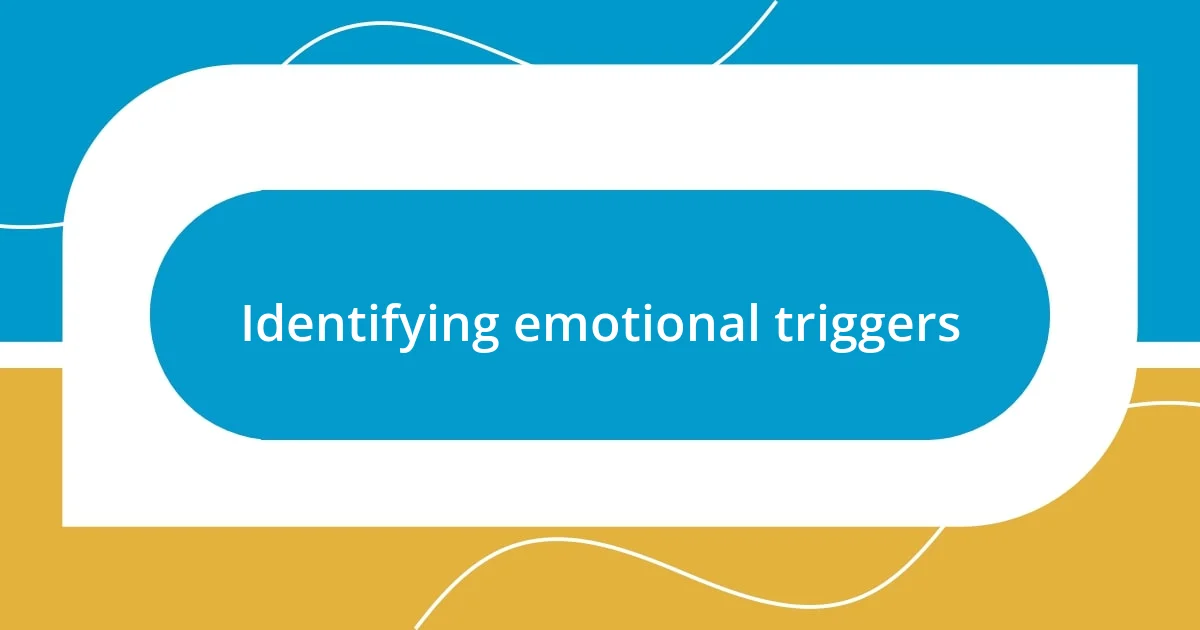
Identifying emotional triggers
Identifying emotional triggers is crucial when we face sudden changes. For me, one significant trigger is the feeling of losing control. I recall a day when I was set to lead a workshop, and just an hour before it began, a major section was omitted. My heart raced, and a wave of unease washed over me. Recognizing this feeling allowed me to pause, take a breath, and ground myself in the moment.
Another emotional response I often experience is disappointment. During a team project, we faced a complete pivot in our objectives at the last minute. I was initially frustrated because it felt like our hard work had been dismissed. However, by pinpointing this disappointment as a trigger, I was able to shift my mindset toward finding value in the new direction. The lessons I gleaned from that situation were invaluable.
It’s fascinating how our emotional reactions can define our response to change. Sometimes, I feel an overwhelming sense of excitement when challenges arise. This mixed reaction helps me realize that while change can disrupt, it also opens the door to innovation. Identifying which emotions surface during these moments helps me tailor my reactions and strategies moving forward.
| Emotional Trigger | Personal Experience |
|---|---|
| Loss of Control | Leading a workshop, my heart raced when a major section was eliminated last minute. |
| Disappointment | Frustration arose when our project objectives shifted suddenly, but it led to valuable lessons. |
| Excitement | Feeling energized by unexpected challenges helps in fostering innovation. |
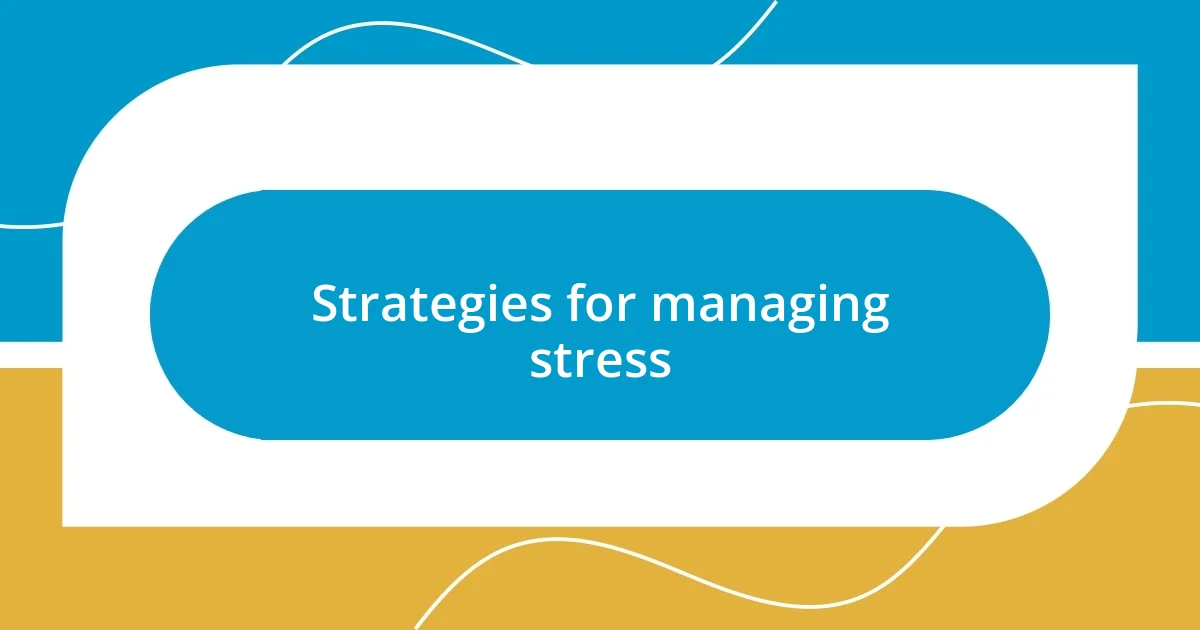
Strategies for managing stress
Strategies for managing stress
When faced with last-minute changes, it’s essential to have effective strategies to manage stress. I’ve found that deep breathing works wonders; it’s a simple yet powerful tool. For instance, during a surprise meeting called at the end of a long week, I took a moment to breathe deeply and recenter myself. This brief pause helped me regain focus and clarity before diving into the discussion.
- Prioritize tasks: Write down what absolutely needs to get done and focus on those first.
- Practice mindfulness: Techniques like meditation or focused breathing can ground your thoughts.
- Stay organized: Keeping a planner helps anticipate potential changes and prepares you mentally for whatever comes next.
During a significant work event, an unexpected guest presenter arrived, altering our schedule completely. I felt a surge of anxiety, but I quickly implemented a strategy I had learned: reframing the situation. Instead of stressing about the disruption, I reminded myself of the chance to learn from someone with fresh insights. Shifting my perspective enabled me to engage enthusiastically, and it transformed a potentially stressful moment into an enriching experience.
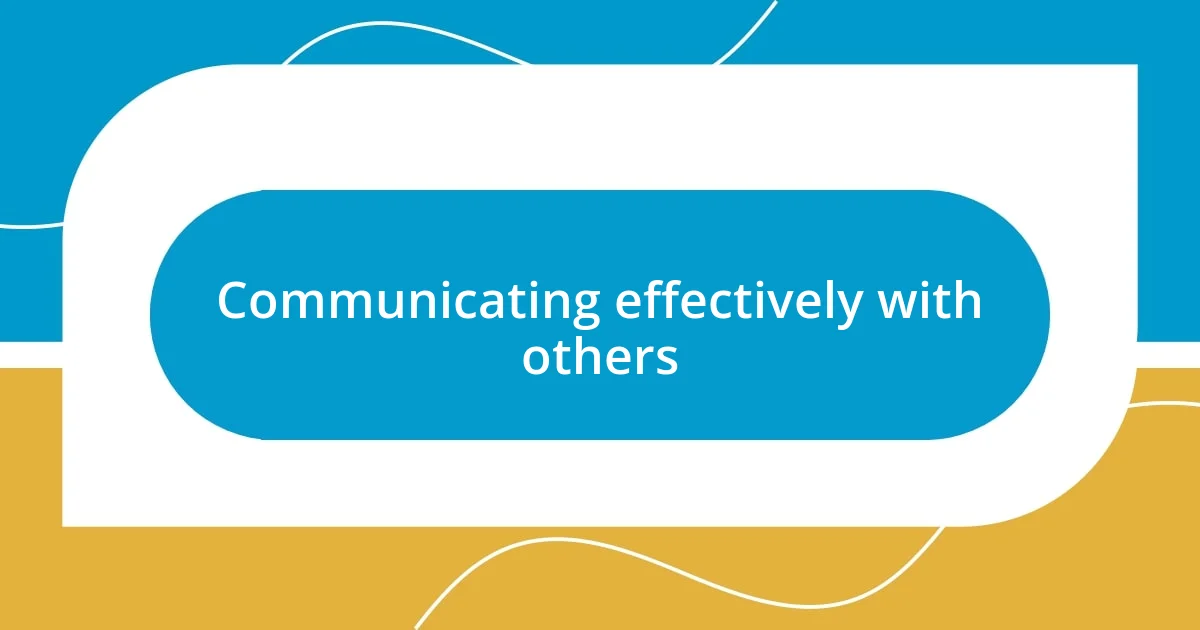
Communicating effectively with others
Effective communication is a cornerstone when navigating last-minute changes. I remember a time when a crucial report had to be reworked just before a presentation. Instead of panicking, I reached out to my team via a quick group chat. It was incredibly helpful to share my concerns and hear their insights, reminding me that I’m not alone in these moments.
Listening actively is key. In one instance, during a team brainstorming session, someone voiced a completely different idea that initially caught me off guard. Rather than dismissing it, I took a moment to process and respond constructively. By doing so, we ended up refining the idea together, transforming it into a solution that everyone felt invested in. Isn’t it incredible how open dialogue can lead to unexpectedly brilliant outcomes?
Additionally, expressing my feelings openly has fostered a culture of honesty among my colleagues. Recently, when we faced a sudden budget cut, I shared my disappointment with my team. This vulnerability sparked a powerful discussion where everyone expressed their thoughts, leading us to collaboratively brainstorm alternative strategies. What I’ve learned is that when you communicate with authenticity, it opens the door to collective problem-solving and strengthens team bonds.
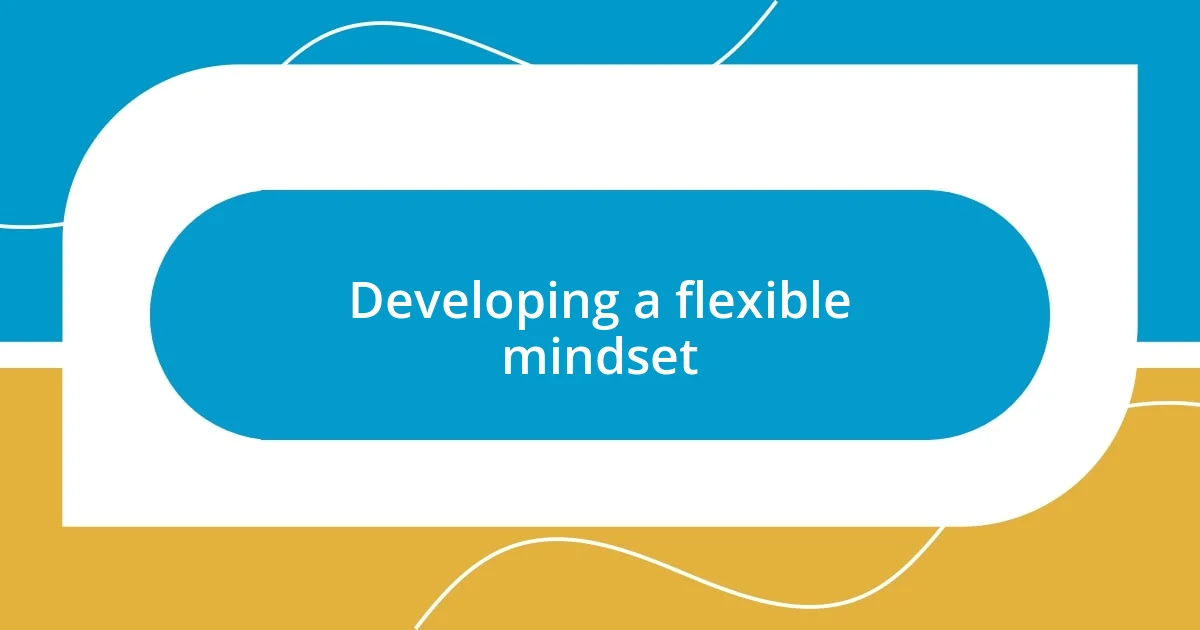
Developing a flexible mindset
Developing a flexible mindset is crucial when adapting to last-minute changes. I recall an instance when a project deadline shifted unexpectedly. Instead of succumbing to frustration, I embraced the change as an opportunity to enhance my planning skills. It’s amazing how a slight shift in perspective can transform chaos into possibility.
Another time, while preparing for a major presentation, I had to adjust my content on the fly due to new insights. At first, it felt overwhelming, but I allowed myself to feel the discomfort. Acknowledging my emotional response helped me remain open to those changes, leading to an even stronger presentation. Isn’t it fascinating how discomfort can sometimes be the catalyst for growth?
Cultivating a flexible mindset isn’t just about reacting adequately; it’s an ongoing practice. I find that regularly challenging my assumptions helps build resilience. For example, when experimenting with new tools for collaboration, I sometimes face setbacks. Yet, embracing those moments as part of the learning process fosters adaptability. After all, isn’t adaptability the ultimate survival skill in our fast-paced world?
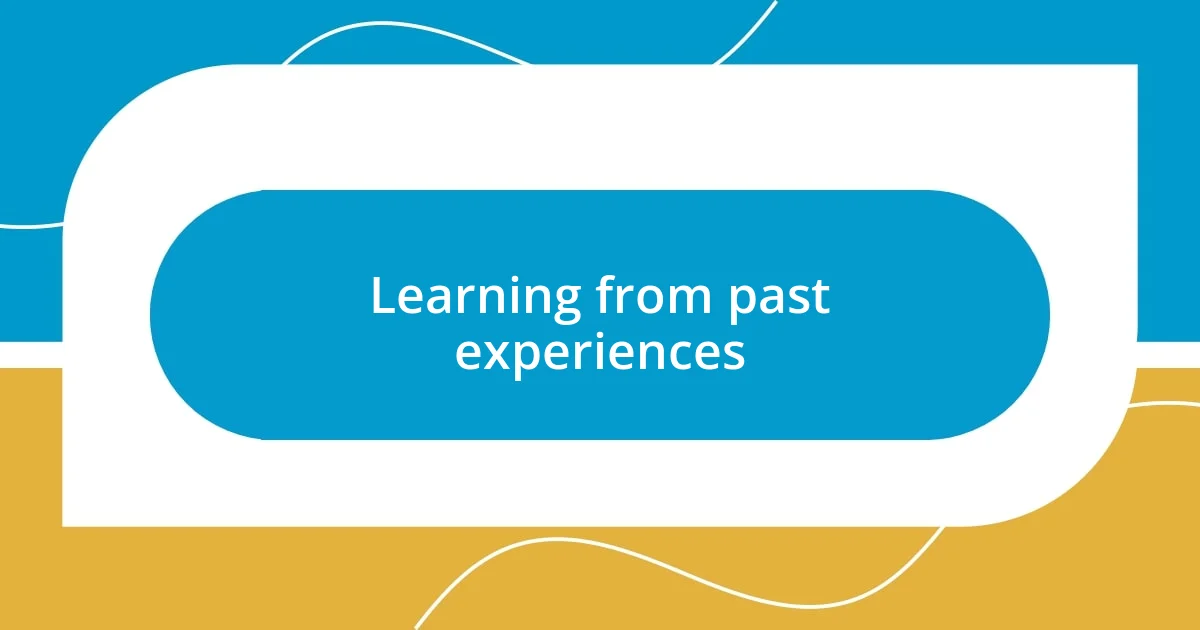
Learning from past experiences
I’ve often found that reflecting on past experiences really helps me navigate last-minute changes. Once, during a project launch, everything seemed to spiral out of control right before our big day. I took a moment to revisit how similar situations went in the past, specifically the lessons I learned from those high-pressure moments. It was reassuring to remind myself that adaptability was key, and it encouraged me to approach the new challenges with a sense of calm and determination.
One particularly unforgettable lesson came during an unexpected team reshuffle. Initially, I felt frustrated by the sudden change in dynamics. However, looking back, I realized how embracing this new reality helped me discover strengths I didn’t know I had. Have you ever experienced a situation that felt daunting at first but turned out to be a great learning opportunity? I certainly have, and it taught me that each challenge carries a hidden lesson, even if it takes a while to uncover it.
Ultimately, I believe that reviewing my past reactions to last-minute changes has enriched my approach today. I’ve learned to ask self-reflective questions: How did I handle surprises? What strategies worked, and what didn’t? This kind of introspection allows me to refine my responses and keeps me prepared for whatever curveballs come my way. Isn’t it empowering to realize that we can turn every experience into a stepping stone for growth?
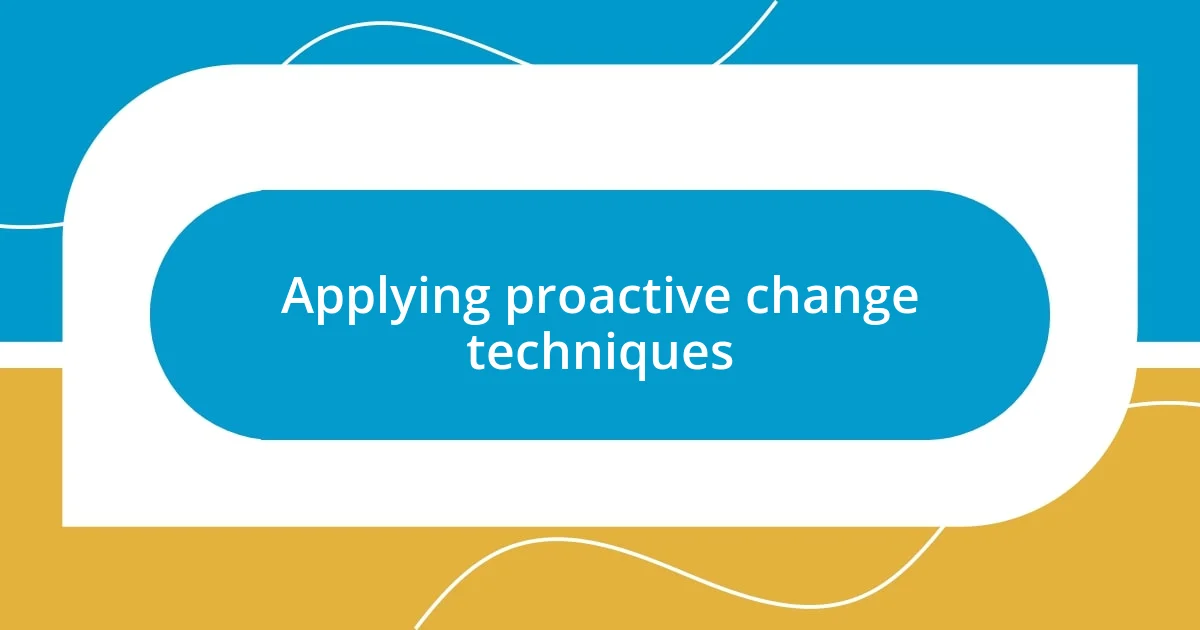
Applying proactive change techniques
Applying proactive change techniques can make all the difference when faced with unexpected shifts. I remember preparing for a crucial quarterly meeting when the agenda completely changed just 24 hours beforehand. Instead of panicking, I reached out to my team for a quick brainstorming session. This collaborative approach not only eased my stress but sparked a wealth of creative ideas that enriched our new presentation.
One technique I’ve found effective is scenario planning. During times when I sensed potential changes looming, I created multiple pathways we could follow, which helped me feel more in control. For instance, while working on a marketing campaign, I developed alternative strategies for different market responses. When changes inevitably occurred, I felt ready and empowered, well-prepared for whatever came my way. Isn’t it incredible how preparation can transform uncertainty into a source of strength?
Another method I apply is maintaining open lines of communication with my team. I recall when our project scope was altered drastically mid-way through; I organized regular check-ins to discuss our progress and concerns. This transparency created a sense of shared ownership within the team and ensured that everyone felt included in the decision-making process. It reminded me that proactive effort can turn even the most chaotic situation into a collaborative triumph, don’t you think?












